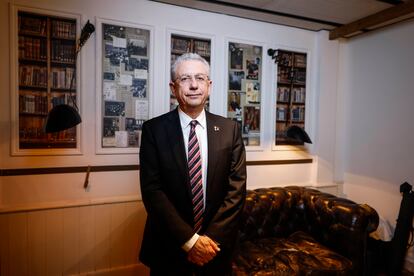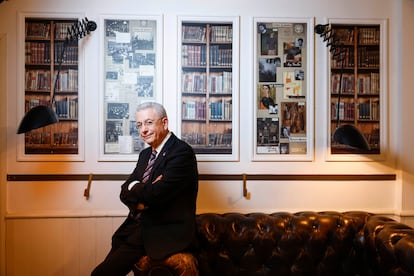Mustafa Barghouti, former Palestinian minister: ‘We can live together in one democratic state’
The co-founder of the Palestinian National Initiative calls for military and economic sanctions against Israel and for the EU to end its association agreement with the country

When Mustafa Barghouti, 70, a Palestinian doctor and politician, thinks of his land back in 1967, what he remembers is a people already occupied by the Israelis; also a nation that had lost hundreds of thousands of people since the declaration of the state of Israel in the late 1940s. Then came the Six-Day War and more upheaval. Barghouti, who was visiting Madrid on behalf of the Novact Institute, admits that his childhood came to an abrupt end. “I realized that others would not solve our problems,” he says.
At the beginning of the 2000s, Barghouti founded, together with the philosopher Edward Said, the Palestinian National Initiative. As a member of this party, he came in second place in the 2005 presidential elections, behind Mahmoud Abbas, leader of Fatah and current president of the Palestinian Authority (PA). Two years later, Barghouti would lead the Ministry of Information.
Question. How does the recent recognition of the state of Palestine by Spain, Ireland and Norway affect the identity of its people?
Answer. Recognition will not bring us identity. Identity brought us recognition of 146 countries. It’s an important moral step. It’s also important psychologically because it means we are not alone. We appreciate the role of the Spanish government because they lobbied others to recognize Palestine. We know that because of the Spanish decision, other countries will join, like Malta and Slovenia and probably Belgium. And maybe this will make France feel jealous [laughs] and also recognize Palestine. On the other hand, we know that this is not enough. What we are subjected to now is not only occupation and the system of apartheid, but barbaric genocide and war crimes: genocide, ethnic cleansing and collective punishment, with Israel even using starvation as a weapon. And for that, in addition to the recognition, we need immediate punitive acts, sanctions on Israel to force it to respect and implement the International Court of Justice Resolution to stop the war
Q. What does your Palestinian state look like, the one you dream of and for which you have worked for so many decades?
A. A democratic state with equal rights for everybody, where there is no discrimination because of religion, nationality or ethnicity, where people have equal opportunities. A country that will definitely prosper because we have very talented people. All we need is freedom. It’s up to the Israelis if the future will be two states or one state.
Q. You defend the one-state solution, even when the two-state solution seems impossible.
A. Spain, Ireland and Norway not only recognize Palestine, but also our right to self-determination, whether in two states or one. Some tell me that Israelis will never accept one democratic state. And my response is that they don’t accept the two-state solution either. [Far-right Israeli minister Bezalel] Smotrich, who calls himself a “fascist homophobe,” says they will fill the West Bank with settlements and settlers until the Palestinians lose all hope of having a state of their own. Then Palestinians will then have to choose between leaving Palestine, which is ethnic cleansing, or accepting a life of subjugation to the Israelis, which is apartheid, or die, which is exactly what they are trying to do now in Gaza, which is genocide.
Israel has to decide what do they want. If they want to separate us, they have to agree to end their occupation and settlements. But they don’t want to do that. We can live together in one democratic state.
Q. One state for everyone with the same rights. Right now, that seems difficult.
A. What is easy? My friend [composer] Daniel Barenboim once told me something very interesting: sometimes the impossible is easier than the difficult. Nobody can claim to support the two-state solution without the removal of the occupation; the removal of all settlers from the occupied territories; reversing the decision to annex East Jerusalem, and finally allowing Palestinian refugees to come back home. Without this, anybody who talks about a two-state solution is practicing hypocrisy. It’s only a slogan to give Israel time to finish the job of annexation.
Q. Is the PA the best possible actor to run a Palestinian state?
A. No, it is a structure which is lacking democracy and needs to be reformed. Governance reform means the right of the Palestinian people to democratically elect their leaders.
Q. Can this democratic process be developed in the midst of war?
A. No, when the war is over. But until this happens, we need a government of national consensus, accepted by all parties, so that it can work and maintain the unity between the West Bank and Gaza. A government that is interim. Once the war is over, it has to prepare for free democratic elections. In 2021, we were about to have elections, but Israel obstructed them and the United States did not support them. The PA made a huge mistake by not accepting what we proposed, elections in Jerusalem without Israeli permission, to turn it into an act of non-violent resistance.
The Palestinian Authority was itself afraid of the elections, so they canceled them. If we had had elections in 2021, no party would have won a majority. It would be a pluralistic and democratic structure. We would not have had this war, because we would have had a unified government for the West Bank and Gaza, and, probably, this would have improved the possibility of lifting the siege on Gaza. See what kind of opportunity we lost. We could have saved the lives of 45,000 Palestinians.

Q. One of the political actors in Palestine is Hamas, the main objective of the Israeli offensive.
A. Israel claims so, but their target is not Hamas. Their target is all the Palestinian people, to ethnically cleanse Gaza. Netanyahu said they should evacuate everyone to the Sinai, to Egypt. For him, the war was not about October 7 [the date of the Hamas attack on Israeli territory that left more than 1,200 people dead and dozens kidnapped]. For him, it was an opportunity to solve the demographic problem by ethnically cleansing the inhabitants of Gaza.
Q. Have you seen a war like the current one in your 70 years?
A. No. We’ve never seen anything so barbaric, so drastic, so cruel and so criminal. Not in 1967, not in 1948. This is the most vicious war ever waged. And the target is the civilian population. My heart breaks because I see the results. It is not only 36,000 people that Israel has killed, but 46,000 because there are 10,000 who are still under the rubble decomposing. This is the longest war in the history of Israel. They destroyed all the universities, the schools, most of our medical facilities, 34 out of 36 hospitals. They killed 500 of my colleagues, doctors, nurses, health professionals. They prevented journalists from entering Gaza. And then they killed 144 Palestinian journalists. It’s a terrible genocide: 81,000 people were injured and many of whom will not survive because there are no medical services to help them.
Q. We talk about the recognition of Palestine, the ceasefire, negotiations, borders, but peace is something else: reconciliation, forgiveness, responsibility... How long will it take for the Palestinians to overcome this?
A. It will take time. But we will not be hostages to the fact that we are the victims. We are victims, but we will not sit in that corner. We will have to find solutions so that no more attacks like this happen again; so that no more Palestinians are killed, and so that there are no more genocides. That’s why I say now, thank you for the recognition, but please impose sanctions.
Q. What sanctions do you propose?
A. Military and economic. It is unacceptable that any country would provide military equipment or buy military equipment from a country that is committing genocide. Furthermore, the European Union must suspend the EU-Israeli Association Agreement. They can do that because it is shameful to continue to support the Israeli establishment, which is committing genocide and war crimes.
Sign up for our weekly newsletter to get more English-language news coverage from EL PAÍS USA Edition
Tu suscripción se está usando en otro dispositivo
¿Quieres añadir otro usuario a tu suscripción?
Si continúas leyendo en este dispositivo, no se podrá leer en el otro.
FlechaTu suscripción se está usando en otro dispositivo y solo puedes acceder a EL PAÍS desde un dispositivo a la vez.
Si quieres compartir tu cuenta, cambia tu suscripción a la modalidad Premium, así podrás añadir otro usuario. Cada uno accederá con su propia cuenta de email, lo que os permitirá personalizar vuestra experiencia en EL PAÍS.
¿Tienes una suscripción de empresa? Accede aquí para contratar más cuentas.
En el caso de no saber quién está usando tu cuenta, te recomendamos cambiar tu contraseña aquí.
Si decides continuar compartiendo tu cuenta, este mensaje se mostrará en tu dispositivo y en el de la otra persona que está usando tu cuenta de forma indefinida, afectando a tu experiencia de lectura. Puedes consultar aquí los términos y condiciones de la suscripción digital.









































